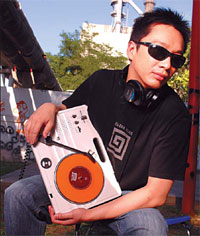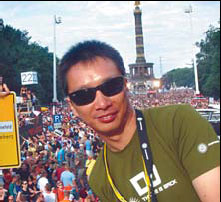Putting the world in a spin
Twenty years ago, the concept of electronic dance music was mostly foreign to China, but today, Chinese DJs are bringing their own homespun style to the turntable.
"It's not like before, when people said, 'that's a Western person's lifestyle'. It's becoming a Chinese person's lifestyle," said Jack Zhu, 34, who runs the Beijing-nightlife-oriented website clubzone.cn.
Now, there are enough DJs in China's international cities that clubbers can be choosey about how they get their fix of boom, boom in a dark room.
This multitude of DJs has risen to satisfy the growing demand for dance music created by the mushrooming number of nightclubs operating in China's urban centers.
"China has been put on the club map of the world," said Zhang Youdai, the 20-year scene veteran hailed as the "Godfather of Chinese DJs" and the first Chinese DJ featured by Rolling Stone for his work as a radio DJ.
However, as the 40-year-old Beijinger points out: "Clubs in China are just beginning, and the scene is still growing up. More young people are going out to have fun."
In the midst of China's rising affluence, the nightclub has emerged as an iconic symbol of the leisure life an for many rich young people, the DJ has emerged as a figurehead of this newfound form of nightlife.
As Yue Zheng, who is known as DJ Marco Polo when DJ-ing at Shenzhen's True Colour Club, said: "The DJ is the soul of the club."
And with new clubs opening weekly, a lot of souls are needed.
"We have so many DJs per capita, it's ridiculous," said American Katie Pomerantz, owner of the dance-music oriented entertainment company Beijing's Other Events.
Consequentially, the 24 year old from Topeka, Kansas, said the DJ-ing standards were very high.
But it has taken a long time for Chinese DJs to get where they are today, and many feel they still have a long way to go. "I am very serious about including cultural elements in the music I create," said Zhang Ran, who is known as DJ Mickey Zhang in dance music circles. "I don't like commercialized or entertainment-oriented dance music. The music I create tells stories about our cultural movement."
As one of China's most renowned homespun DJs, Zhang Ran, 29, is tuned in to the musical preferences of the emergent generation of Chinese clubbers. He and his cohort, 35-year-old Wang Xiaoding, who is known as DJ Dio behind the turntables, have become household names among China's nightlifers. Their acclaim comes from their performances at entertainment company O2culture's Morse and Yen parties, which have become the capital's best-known homegrown electronic music events.
The "godfather of Chinese DJs", Zhang Youdai (pictured top and above), is among a select few to tour internationally. |
"I'd never heard that kind of music before," Zhang Ran said, recalling the first time he saw a DJ perform 12 years ago. He became infatuated, and began studying the craft until one day, he asked an agreeable bar owner if he could try his hand at the turntables. After a year of DJ-ing in Zhuhai, he did a stint in Shenzhen before touring China and eventually settling down in Beijing.
Wang Xiaoding began as the understudy of a British DJ spinning in China 14 years ago before embarking on his own. "When the scene began in China, there were a lot of foreigners, but after two or three years, you began to see more Chinese," Wang said. "Today, 90 percent of the DJs in China are Chinese, because many of the foreign DJs here aren't as good, and their culture is different. They don't know as well what Chinese people like."
Wang said it's hard to pinpoint exactly why foreign DJs have trouble tuning in to the musical tastes of Chinese electro-geeks. He says the difference in performance styles is difficult to describe and not vast, but he knows it when he hears it and so do Chinese crowds.
"It's like the differences in Western and Chinese food. You can try it once or twice, but it's hard to take every day," Wang said.
According to Zhang Ran, O2culture's parties attract nearly even numbers of foreigners and locals. While the foreigners come from all walks of life, the Chinese attendees are usually upper and middle class members of artistic, cultural and film circles, aged 18-25.
However, given the specificity of this clubbing culture's membership, it's been more difficult for dance music to make major strides in China's second-tier cities, where these demographic groups are smaller. Consequentially, the nightclub scenes of these cities lag behind those of the country's international metropolises.
Yue said the popularity of Chinese disco has usurped foreign varieties of dance music. However, the 27-year-old is confident that foreign forms of dance music will gain popularity in China once more Chinese are exposed to it.
During the last two years in particular, the country has become a hotspot for the world's best DJs, attracting the who's who of the genre such as Carl Cox, DJ Sasha, Paul Oakenfold and John Digweed.
When Cox was in Beijing in December on his second China tour, he told China Daily about his great expectations. "China is happening and is ripe now for this sort of music. It can grow organically, and it won't be just a hype thing, which will boom in two years and go away."
(China Daily 02/09/2007 page18)















